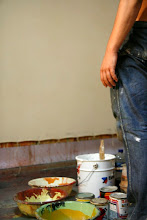What differentiates the artist from the common man, is never, even if it is said so, the talent. It is the insolence. Art is not in the way and neither in the style. It is in the disposition. Artist is everybody who comes to transgress the established order.
“Art is the mortal opponent of freedom,” says Lennep. Therefore, the necessity to re-establish fences emerges, to raise healthy obstacles, to conduct any objection for such appetite of freedom, which encourages (and extenuates) the modern man.
When, the artist, doesn’t encounter its own restrictions out there, he will search in his inner self.
Nevertheless, it is a labyrinth, evoking the myth of Icaro, which escaping from it, ended up by burning his wings to the sun. The labyrinth symbolises the journey of the soul through the darkness, in search of the light. This particular search comes from creativity, because any human knowledge comes from art. Any ability comes from the artistic capacity, as to say, to be active creatively. “All human beings can be artists” would state Joseph Beuys.
The process of creation, depending on each person, needs at some point an alibi, a cause, a stream of mind, an Ariadne´s string. The sources of inspiration are infinite; it all depends on the disposition of each one, in front of this world.
My father, a man of the world, each time he was coming back from one of his trips, he was bringing for me a book in which he was always writing a thought, a text or a little dedication on the first page.
On the same day of 11th of September of 2001, he was very close to the events, which marked the entire world. Fortunately, he came back safe. On the first page of the book that he brought for me that time, I read the words that testified the extreme fragility of men’s life in this world. His thoughts were followed by a paragraph on a personal experience of the past when he had the chance to meet Tennessee Wiliams, and to ask him the duty of a writer at these difficult times. The response that he got was: “To write”.
Concluding my father wrote me: “fulfill whatever you have promised yourself to accomplish, this is your duty in front of the terror of our existence”.
I paint!
My work is constituted by two parallel perceptions, captured in several series, apparently independent the one from the other, but if perceived together they will form two complementary entities.
The first one offers a subjective gaze towards the outside. It is sociologically implicated and directly inspired by the observation and affirmation of the decline of our social and environmental surroundings. The use of photography’s immediacy, the material weight of paint and the printed contrast of the engraving, reflect the harshness of the actual landscape. Nevertheless, avoiding of being dramatic and catastrophist, the work tends towards the enhancement of its grandiosity and beauty, bringing the viewer to a confrontation with his own feelings, in front of reality’s tragic facts and the esthetical delight of the image.
The second entity turns its gaze to the inside. It is a personal space, almost a privet one, without lacking, though, a certain brechtian distanciation. Samuel Becket’s words, in “detritus”, echo in my mind: “I will tell you a story, it would not be me…”
In this space, the work tends towards a visual poetry. Here, the word “poetry” drags its sense from its etymologic root, of the Greek verb “poiw” which means: “ to make”.
Therefore, the main theme is “the praxis”, the action in itself, the need of artistic expression, indoors: the artist in his studio during the sacred act of creation.
In the quest of the creative act, one of the references would be the universe of theatre and its conditions, such as depicted in Peter Brook’s books. These particular conditions are as much valid to the actor as for any artist at the moment of creation, converting, in a way, the artist’s studio into a stage, where the painter becomes actor and director of his work, choosing his own tools and creating his own world. Space and time are bended, obeying different laws, where the major value it is owned by the proper creation, the poetry, being the vehicle for the exploration and the study of oneself, tending with hope and courage towards a possibility of salvation.
Suscribirse a:
Enviar comentarios (Atom)

No hay comentarios:
Publicar un comentario